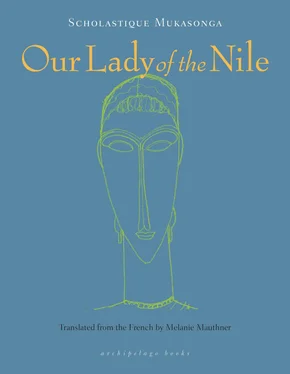“You’ll take a shower, and I’m sure you’ve got enough beauty products in that case of yours to put things right.”
“That’s true. I managed to find some skin-whitening creams, but not that Venus de Milo stuff you get at the market. American ones: tubes of cold cream and green antiseptic soap. My cousin sent me them from the Matonge quarter in Brussels. I’ll give you some.”
“What would I do with them? There are those who are beautiful, or think they are, and those who are not.”
“You look so sad, aren’t you glad to be back at school?”
“Why should I be glad to be back at school? I always get the worst grades. The teachers feel sorry for me, but not the rest of you, my dear classmates. It’s my dad who wants me to stay on, in spite of everything. Once I get the diploma, he hopes to marry me off to a banker like him. But I’m sure he’s got other plans too.”
“Cheer up, Godelive. It’s our final year and then you’ll marry a rich banker.”
“Don’t make fun of me. Maybe I’ve got a surprise for you all, a big surprise.”
“And what surprise might that be?”
“If I tell you, it won’t be a surprise.”
Gloriosa welcomed Godelive and Immaculée with disdain, casting a scornful eye over Immaculée’s skintight trousers and plunging neckline. Gloriosa wondered why she was covered in dust but decided against asking her right now. She ignored Godelive completely.
“I’m counting on you girls to be real militants,” she whispered under her breath. “Not like you were last year. Our Republic requires more than vanity and a banker father.”
Immaculée and Godelive pretended not to have heard a word.
With Father Herménégilde as their shepherd, the shy herd of newcomers passed through the gate under Gloriosa’s searching gaze:
“Did you notice, Modesta?” She sighed. “The old regime still wields influence in the ministry. They’re lax with the quota. If I counted right, and I only counted the girls I know, those I’m sure of, we’re way over the percentage that, unfortunately, they’ve been granted. A fresh invasion! What was the point of our parents’ social revolution if we let them carry on like this? I’ll be reporting this to my father. But I think we’re going to have to take care of things ourselves and get rid of these parasites, once and for all. I told the Bureau of Militant Rwandan Youth about it, and we see eye to eye. They listen to me. It’s not for nothing my father named me Nyiramasuka.”
Ever since the lycée opened, no one in Nyaminombe had seen a car like the one Frida arrived in. It was very long and low-slung, bright red, with a soft top that had been seen to fold and unfold without anyone touching it. There were only two seats. Both driver and passenger reclined in them as if in bed. It made a noise like thunder, leaping forward in a cloud of red dust. For a moment, it looked as if it would ram the gate and knock Sister Gertrude, Gloriosa, and Modesta flying, but it stopped short, with a hellish screech, right at the foot of the flagpole.
Out stepped a man of a certain age, wearing a three-piece suit (with a floral-patterned waistcoat), large dark glasses with gold-tinted frames, and a crocodile-skin belt with matching shoes. He opened the passenger door and helped Frida extricate herself from the seat in which she was half embedded. Frida smoothed out the creases in her dress, which was as red as the car, and it flared like an umbrella. Beneath her little scarf of purple silk, you could see her brutally straightened hair, stiff, starched, and shimmering in the sun like the asphalt used to resurface some of Kigali’s streets not that long ago.
The sports car’s driver addressed Sister Gertrude in Swahili (ignoring Gloriosa and Modesta): “I am His Excellency Jean-Baptiste Balimba, the Ambassador of Zaire. I have an appointment with the Mother Superior. Take me to her immediately.”
Shocked that anyone would speak to her in that tone, and in Swahili no less, Sister Gertrude hesitated for a moment, but seeing how the man seemed determined to force an entrance, she felt compelled to lead the way.
“Wait for me in the hall,” she told Frida. “I’ll sort this out, I won’t be long.”
Gloriosa had pointedly marched out of the gate to greet the nine seniors who were just getting out of a minibus.
“There’s our quota,” she said, watching as a small truck pulled up, sagging beneath the weight of a wobbly pyramid of barrels and badly stacked cardboard boxes. “See, Modesta, nothing will ever stop the Tutsi from their trafficking: even when they take their daughters back to school, they need to make it worth their while. They unload the goods at the Nyaminombe store, but whose store is it? A Tutsi’s, of course; apparently some distant relative of Veronica’s father, who himself has a business in Kigali. Oh, she’s something, that Veronica; believes she’s so beautiful, she’ll end up selling herself. And Virginia, her friend, who thinks she’s the most intelligent girl in the lycée, simply because all the white teachers dote on her. You know what she’s called? Mutamuriza, ‘Don’t Make Her Cry’! Well, I certainly know how to make her do exactly that. Two Tutsi for twenty pupils is the quota, and because of that I know some real Rwandan girls of the majority people, the people of the hoe, friends of mine, who didn’t get a place in high school. As my father likes to tell me, we’ll really have to get rid of these quotas one day, it’s a Belgian thing!”
Gloriosa’s rant was accompanied by little coughs of approval on the part of Modesta, but when she started to lavish overly affectionate hugs of courtesy on the two Tutsi, Modesta moved away.
“The tighter you embrace those snakes,” said Gloriosa, once Veronica and Virginia had walked off, “the more you suffocate them, but you, Modesta, you’re scared to be mistaken for your half sisters; you sure look like them, and yet I have to put up with you hanging around with me.”
“You know I’m your friend.”
“Better for you, then, that you always stay my friend,” said Gloriosa, hooting with laughter.
At sundown, the clanging bell and the creaking of the closing gates solemnly ushered in the start of the new school year. The monitors had already led the girls to their various dormitories. The seniors were entitled to certain privileges. Their dormitory was divided into alcoves to give each girl some privacy — all relative, since the only thing that separated them from the corridor, where the monitor did her rounds, was a thin green curtain that the sister could pull open at any moment. And although this partitioning of beds, which they called “rooms,” was presented by Mother Superior as an example of the progress and emancipation the girls could enjoy thanks to the education provided by the lycée of Our Lady of the Nile, not everyone appreciated it. Late-night gossip and whispers were hushed. Above all, how could a girl sleep on her own? At home, the mothers made sure the younger girls shared a bed or a mat with the older girls. Are sisters really sisters if they don’t fall asleep all squashed together? And how can true friendships form without the exchange of confidences on a shared mat? The lycée girls had a hard time falling asleep in their solitary alcoves. They’d listen out for their neighbors’ breathing behind the partition, and that reassured them a little. In the tenth-grade dormitory, Sister Gertrude refused to let the boarders move their beds together. “We’re at the lycée, here, not at home,” she said. “We sleep alone, each in her own bed, like civilized folk.”
The girls were asked to put on their uniforms and walk to the chapel two-by-two for Mother Superior and Father Herménégilde’s welcome speeches. They sat on the chapel pews, and those girls who didn’t yet have uniforms, or had forgotten them, were relegated to the last pews at the back.
Читать дальше












